
Surface Sterilization Techniques to Prepare Plant Tissues For Culture
As a content and community manager, I leverage my expertise in plant biotechnology, passion for tissue culture, and writing skills to create compelling articles, simplifying intricate scientific concepts, and address your inquiries. As a dedicated science communicator, I strive to spark curiosity and foster a love for science in my audience.


Introduction
The explant is the tissue or plant part you introduce in the culture media for the regeneration of the plant. Therefore, it’s primary to sterilize it well to remove all the dirt, bacteria, or infections stuck on the surface of the explant. It ensures that the resulting plant will be free from any diseases.
The success of tissue culture is based on three main factors:
- To develop contamination-free cultures.
- Induction of plantlet in vitro.
- Transfer of in vitro regenerated plantlets to field conditions.
Thus, it’s necessary to carefully perform each step for higher yield!
So far many surface sterilization techniques have been developed to clean explants. However, the required type, concentration and time of exposure of the disinfectants differ for different plant and plant parts. In this blog, we cover how the sterilization methods are used and a general procedure to sterilize explants. Further we also talk about how you can use PPM (Plant Preservative Mixture—a broad spectrum formulation to eliminate all kinds of contamination) for the purpose.

Types of Explant Sterilization Techniques
Here’re some chemicals most frequently used in labs to sterilize plant explants:
- Sodium hypochlorite: It is also known as bleach. Hypochlorite is very effective in killing bacteria even at a micromolar level. Sodium hypochlorite is one of the most commonly used explant sterilizing chemicals. To use bleach in tissue culture, it is diluted to 10-20%, which results in 0.5-1.0% bleach in the final solution. Each type of explant requires a different amount of time to sterilize. Most of the time, however, 10-20 minutes will suffice. However, the chemical is quite aggressive, which makes calcium hypochlorite a more preferable sterilant.
- Mercuric chloride: The chemical is highly toxic and that’s why it’s rarely used in labs. When sterilizing the explant using this chemical, it’s essential to rinse it many times using sterile distilled water. There shouldn’t be any traces of compound on the explant. Also, follow all precautions and take extensive care while working with the chemical.

- Hydrogen Peroxide: It’s also a dangerous chemical and rarely used for the sterilization process. Therefore, all precautions must be taken to sterilize the explant. The concentration most commonly used in the process is around 30%.
- Calcium hypochlorite: Dissolve the chemical in water and filter it before using it for the sterilization process. The concentration of the explant commonly used to clean the explant is 3.25%. The chemical has been found very effective for sterilization of Ziziphus spina-christi (L.) among other techniques.
- Ethanol: Ethyl alcohol or ethanol is one of the extensively used and powerful chemicals for explant sterilization. However, only a few seconds of exposure must be given to the explant because it’s highly phytotoxic. Longer exposure time will lead to tissue damage. Typically, it is employed at a concentration of 70% (v/v) for a brief period of a few seconds or minutes, followed by a treatment with other chemicals.

General Procedure to Sterilize Explants
The procedure of explant sterilization differs based on the type of explants being used for the tissue culture process. The duration of chemical exposure to the explant and the chemical used is also decided based on the nature of the explant. Because too much exposure to harsh chemicals to soft explants can damage their tissues.
Here’s a general explant sterilizing method to obtain infection-free explants for your tissue culture processes:
- Using tap water remove dust or any other external material attached to the plant part or tissue.
- Wash it again using distilled water.
- Now take some amount of distilled water in a beaker and add a few drops of detergent, such as Tween 20. Put the explant in the solution with continuously stirring.
- Rinse the explant twice using sterilized distilled water.
- Use a sharp scalpel to trim the size of the explant under the laminar hood.
- Surface disinfect the explants using 70% ethanol for 30 seconds. (Some procedures use HgCl2 (mercury chloride), NaOCl (sodium hypochlorite), and bromine water to disinfect explants).
Below is a table for different disinfectants used to sterilize explants, their preferred concentration, and the frequency with which they are used in the tissue culture process. 
- Rinse the explant twice with sterile distilled water.
- Now, transfer the explant to a beaker containing 20% chlorox and sterilize it for 20 minutes. Continuously stir the explant for proper sterilization.
- Rinse the explant with three changes of sterile distilled water.
- Remove the explant and transfer it to a sterile culture medium.
Actions to Enhance Sterilization Procedures
Here're some steps following which can help you clean your explants better when combined with any explant sterilization methods:
- Adding a wetting agent, like TWEEN 20 or 80, to disinfectants can help reduce surface tension and improve contact with surfaces.
- One way to sterilize materials is to soak them in a solution made of 70% ethyl alcohol for a short time. After that, another disinfectant solution can be used to complete the sterilization process. For some species, it has been found that using a two-step sterilization procedure involving two different sources of sterilization can be advantageous.
- Performing the sterilization procedure under vacuum can effectively eliminate air bubbles and enhance the efficiency of the process.
HOW CAN YOU LEARN TISSUE CULTURE AND INCORPORATE IT INTO YOUR PLANT BUSINESS?

We can help!
Seed propagation is an ancient technique and with increasing plant demands, you need a technique that can help you to generate the desired revenue from your business. And, it’s tissue culture.
And, if you are a plant enthusiast or an established business needing help with tissue culture, we’re here!
Plant Cell Technology is a leading company in the tissue culture area. We supply a range of comprehensive solutions and products to ease your tissue culture journey and make your lab more productive than ever.
If you are interested in learning about tissue culture, we have Master Classes curated based on your need. All our classes are designed to train and prepare you to launch your business big and make space for yourself in the ever-expanding plant market. All the classes are led and taught by an experienced instructor of the area, who gives you hand-on-training on the technique, handling plants, and maintaining septic techniques, and teaches you mistakes you should avoid while incorporating the technology into your business.
Interested in our master classes? Check out our upcoming ones on this link!
Furthermore, our store contains a range of products you require to perform your tissue culture experiments, starting from MS media, Agar, PPM™, Plant hormones, and gellan gum. Further, we also provide a unique and simplest bioreactor—The Biocoupler™— for rapid and healthy multiplication of your plants.
If you are stuck in your tissue culture stage and need quick help, we have the consultation you need! Just book your appointment with us and our tissue culture expert will help you with all your queries in a one-on-one video call.
So, if you need anything to grow your plant business using tissue culture, we have everything to streamline and ease your process.
Have any questions for us? Contact us at info@plantcelltechnology.com and we will get back to you to resolve all your queries.
Happy Culturing!!
Blog Categories
View by Level
Popular Blogs

The Technical Intersection of Tissue Culture and Genome Editing
Introduction The ability to modify a plant's genetic code has progressed at a remarkable rate. With the advent of CRISPR-based...
Read More
The Science of Better Multiplication and Rooting in Tissue Culture
Every tissue culture hobbyist or professional eventually hits a plateau. You have a protocol that works, you have your medium...
Read MoreSubscribe to Our Newsletter
1 comment
Hello.
I have a question about hydrogen peroxide.
The article states a concentration of 30%.
Does this mean a 3/10 solution (30ml H2O2 + 70ml water for 100ml solution) from a commercially available 3% hydrogen peroxide solution?
Thanks in advance
Best regards
Jens Güther
Germany









Join the conversation
Your email address will not be published. Required fields are marked